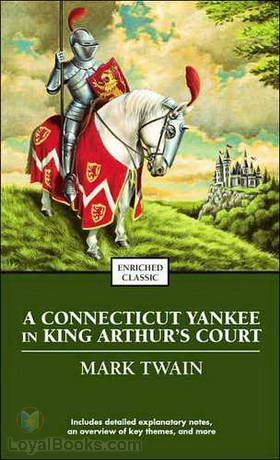
When Hank Morgan, a practical, no-nonsense Yankee who works in an ammunition factory as a head superintendent gets into a fight with an aggressive employee, little does he know what’s in store for him. The bully lays Morgan low with a skull-crushing blow delivered with a crowbar and knocks him out. When Morgan regains consciousness, he finds himself transported back in time, to the sixth century. From here on, the story describes the travails of a hard-boiled, true blue American with strong democratic values who has to deal with medieval feudalism and ancient customs!
A Connecticut Yankee in King Arthur’s Court was published in 1889. Mark Twain wrote it after the great success of his early novels, Tom Sawyer and Huckleberry Finn. His first book, Innocents Abroad had met with a lukewarm reception. Connecticut Yankee… met with mixed reactions. Some regarded it as a great piece of historical fiction. In Britain, it was seen as an attack on their history and culture.
Laced with Twain’s inimitable brand of irreverent humor, the book portrays the sheer absurdity of romanticizing the past. If people in modern times thought Camelot and the legends of the Knights was the perfect world to live in, Twain wanted to show them otherwise. He also sought to strike a balance between the mindless worship of technology and so called “progress.” Hank Morgan also tries to modernize the past! He tries to educate the medieval people about machines, science and tries to dispel their superstitious beliefs in magic.
Many of the famous Knights of the Round Table feature in this book. Other characters like Morgan Le Fay, Merlin, King Arthur and Queen Guinevere also appear, in tandem with many of Twain’s own creations. Mark Twain’s own disillusionment with industrialization and his exploration of the concept of time travel are described in the book. It was in this sense one of the earliest examples of this genre of science fiction.
A Connecticut Yankee in King Arthur’s court has been extensively adapted to stage, radio, screen and television. Since the first silent version in 1921, the book has found favor with Hollywood and a variety of stars have played roles in the films. Disney adaptations, various spoofs and spinoffs, animated versions and references in other books have ensured that the book’s popularity never wanes.
For Mark Twain enthusiasts and readers who love humor blended with some historical fiction, this is indeed a great addition to their collection!

Other Audiobook
Audiobook: Wildwood Ways
American naturalist, Winthrop Packard, takes us on a journey among the wild woods and ponds
Audiobook: Kari the Elephant (Version 2)
Kari the Elephant is a 1922 work by Dhan Gopal Mukerji. The book is the
Audiobook: Birds of the Air
Arabella Buckley had a great love of nature and wished to impart that love to
Audiobook: Kriloff’s Fables
Herein is a collection of 86 fables translated into English from the 201 written by
Audiobook: 2 B R 0 2 B
In this chilling short-story by a master of the craft, Kurt Vonnegut creates a fictional
Audiobook: Address to Free Colored Americans
The first Anti-Slavery Convention of American Women met in New York City in May, 1837.
Audiobook: Bible (Reina Valera) 01: Génesis (version 2)
Como su nombre lo indica, Génesis trata sobre los comienzos. El libro de Génesis habla
Audiobook: decadencia de la mentira
‘La Decadencia de la Mentira‘ forma, junto con otros títulos, la biblioteca de ensayos de
Audiobook: Prefect’s Uncle
The action of the novel takes place at the fictional “Beckford College”, a private school
Audiobook: Love and Mr Lewisham
The teaching profession, science and politics in late 19th century England. H. G. Wells’ humorous
Audiobook: Violet Fairy Book
Andrew Lang’s Violet Fairy Book (1901) was a beautifully produced and illustrated edition of fairy
Audiobook: Alcestis
Alcestis is the earliest surviving play by Euripides. Alcestis, the devoted wife of King Admetus,